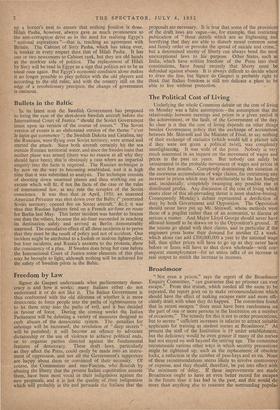The Political Cost of Living
Underlying the whole Commons debate on the cost of living on Monday was a false assumption—the assumption that the relationship between earnings and prices in a given petiod is the achievement, or the fault, of the Government of the day. So clear is it that the cost of living depends on other things besides Government policy that the exchange of accusations between Mr. Shinwell and the Miuister of Food, to say nothing of their exchange of statistics (which would tell a plainer tale if they were not given a political twist), was completely unenlightenithg. It was wide of the Point. Nobody is very much interested in an inquest on the movement of wages and prices in the past six years. But nobody can safely be uninterested in the probable movement of wages and prices in the next few months. Completely dominating the situation is the enormous accumulation of wage claims, far outrunning any increase in prices which may be attributable to the last Budget and, incidentally, completely swamping any possible rise in distributed profits. Any discussion of the cost of living which steers clear of this all-pervading threat is mere shadow-boxing. Consequently Monday's debate represented a dereliction of duty by both Government and Opposition. The Opposition should never have put up Mr. Shinwell, whose methods were those of a pugilist rather than of an economist, to discuss so serious a matter. And Major Lloyd George should never have allowed himself to be drawn on to the Opposition's ground. If the unions go ahead with their claims, and in particular if the engineers press home their demand for another £2 a week, which alone can add £300,000,000 a year to the national wage bill, then either prices will have to go up as they never have before or firms- will have to shut down wholesale—with con- sequent unemployment—for no union talks of an increase in real output to match the increase' in incomes.


























































 Previous page
Previous page